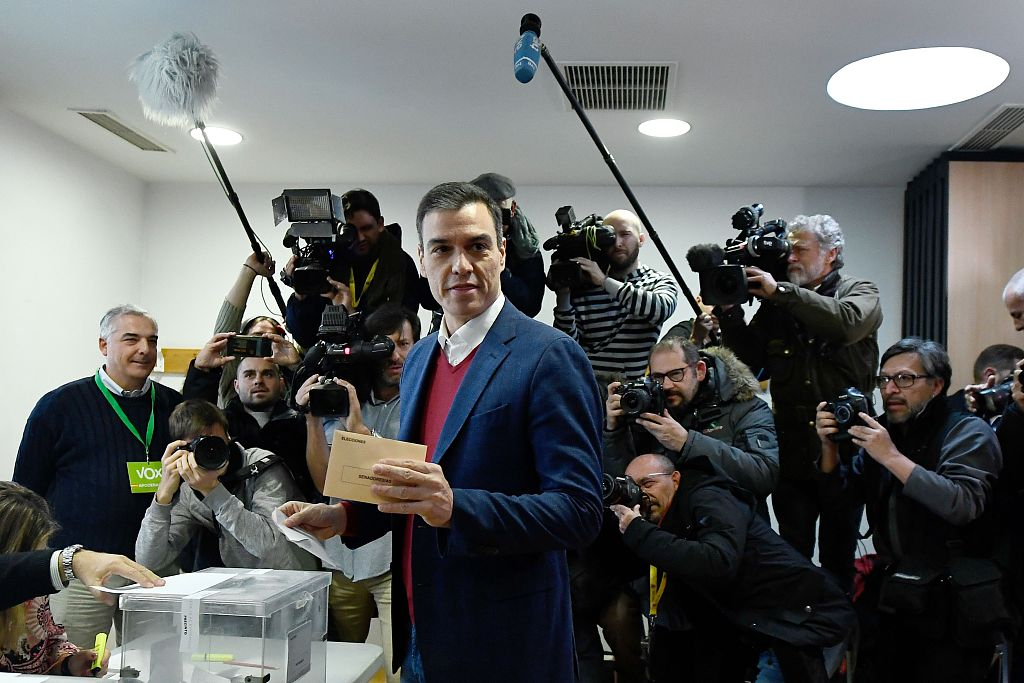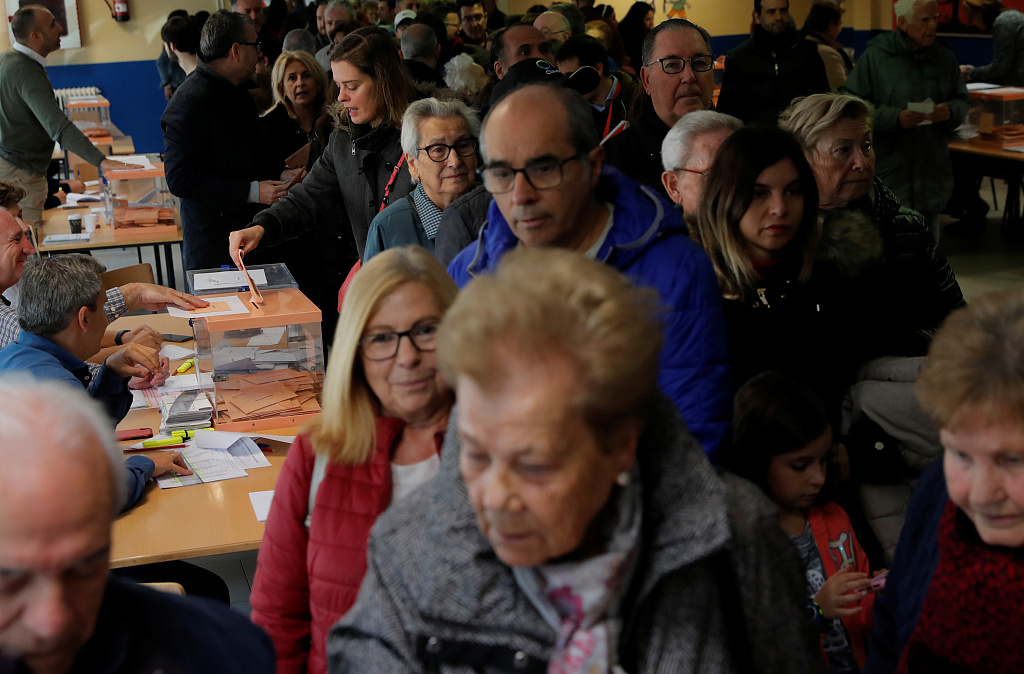The Spanish Socialist Party (PSOE) leader Pedro Sanchez will have a hard time forming a new government after his party did not win a clear majority in the Spanish elections. On Sunday he said that he would call other party leaders to tackle a political stalemate after the country's fourth election in four years again delivered a hung parliament.
Acting Prime Minister Sanchez said he aimed to form a stable, "progressive" government.
The preliminary results once again leave a divided Congress of Deputies (the lower chamber in the Spanish parliament) in which it is hard to see how political parties will be able to find the support to form a government.
Socialists won the most seats in the general election but the far right-wing party Vox saw the biggest increase in votes.

Spain's acting prime minister and Socialist Party (PSOE) candidate for re-election, Pedro Sanchez, casts his ballot at a polling station in Pozuelo de Alarcon, November 10, 2019. /VCG Photo
Spain's acting prime minister and Socialist Party (PSOE) candidate for re-election, Pedro Sanchez, casts his ballot at a polling station in Pozuelo de Alarcon, November 10, 2019. /VCG Photo
The Socialist Party won 28 percent of the votes, compared with 28.67 percent in April, which translated into 120 seats in the 350-seat congress, compared with the 123 they won six month ago.
The conservative Peoples' Party improved on their April performance, winning 20.81 percent of the votes and 88 seats, compared with their record low of 16.69 percent and 66 seats in the previous elections.
Vox made important gains, winning 15.10 percent of the vote and 52 deputies, compared to 10.26 percent and 24 seats in the April vote.
"Eleven months ago we didn't have any representation in any institution, now we are the third party in Spain," said Vox leader Santiago Abascal.

The PP and Vox both benefited from the almost total collapse of the center-right Ciudadanos party, whose support fell from 15.86 to just 6.79 percent, with the number of deputies reduced from 57 to 10.
Ciudadanos party leader Albert Rivera announced a meeting of the party's executive committee, during which he said he would "assume all of the decisions that the party executive takes."
The left wing party Unidos Podemos also suffered a setback, seeing its number of deputies fall to 35 from 42, although this was slightly offset by the arrival of the new left-wing party Mas Pais, which claimed three seats.

Far right Vox party president Santiago Abascal leaves after casting his ballot in Madrid, Spain, November 10, 2019. /VCG Photo
Far right Vox party president Santiago Abascal leaves after casting his ballot in Madrid, Spain, November 10, 2019. /VCG Photo
Spain 'cannot wait any longer'
The leader of Spain's conservative People's Party, Pablo Casado, on Sunday said the country "cannot wait any longer" to have a government, without spelling out if he would do anything to help a government being put together.
Casado also said Spain would be harder to govern after Sunday's election result, which delivered a hung parliament.

People queue to cast their votes inside a polling station during the general election in Madrid, Spain, November 10, 2019. /VCG Photo
People queue to cast their votes inside a polling station during the general election in Madrid, Spain, November 10, 2019. /VCG Photo
Casado said his party, which came second in the election, would fulfill what he called "its duty" and was awaiting the next move from Pedro Sanchez's Socialists, without giving any details.
The leader of Podemos, which failed to form a coalition government with the Socialists after last April's elections, said on Sunday he was still hopeful of reaching a government deal following Sunday's repeat election.
Pablo Iglesias said he was ready to start talks with the Socialist Party of acting Prime Minister Pedro Sanchez as soon as Monday.
The two parties, however, do not have enough seats for a parliamentary majority and would need to negotiate support with other forces in a highly fragmented lower house.
(With input from agencies)